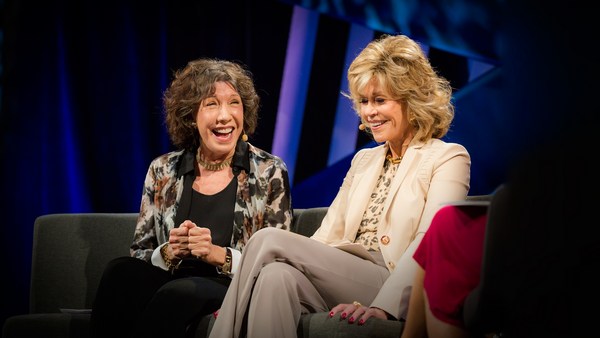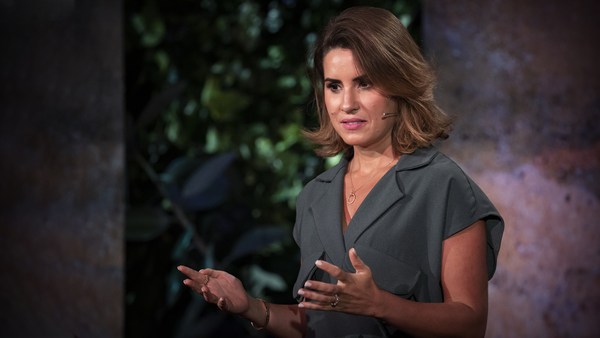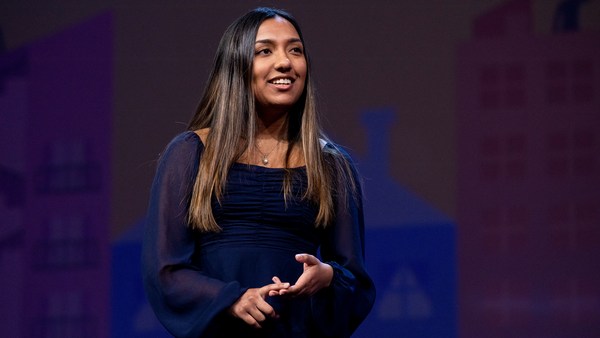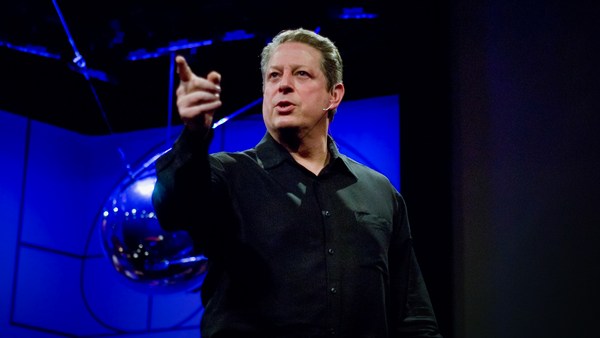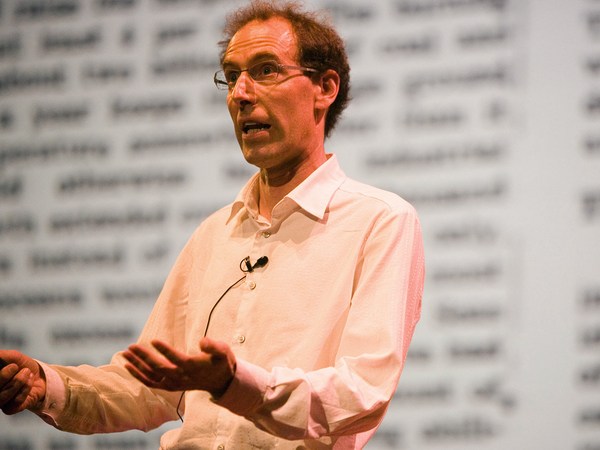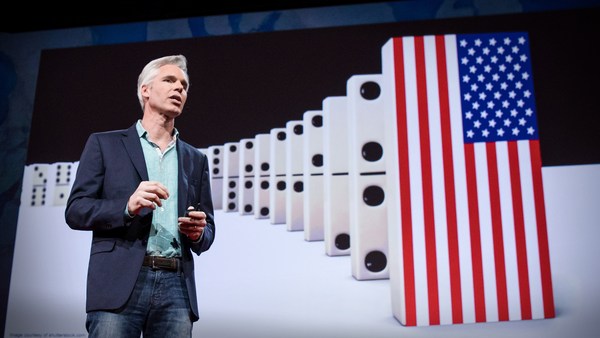Pat Mitchell: Welcome, Jane. The last time you joined us --
Jane Fonda: Hi, Pat.
PM: It's so good to see you, as always. The last time you joined us on TEDWomen, Jane, I was thinking about that this morning, you were in the nation's capital, Washington, DC, and you were leading the weekly protests, Fire [Drill] Fridays -- Fire Drill Fridays, in partnership with the Greenpeace International. You got arrested, it made headlines. and certainly, all of the civil disobedience actions brought attention to the crisis. And I understand that you are restarting Fire Drill Fridays in December. What are your goals and expectations?
JF: Well, our goal with Fire Drill Fridays was and continues to be to move people from concern about the climate crisis to action about the climate crisis. And we've been successful. We're coming back on December 2 to Washington, DC, for our first live, in-person rally, which will address the outcome of the midterm elections. And we'll talk about what climate activism needs to look like in 2023. But, you know, Pat, we never stopped the weekly rallies. When COVID hit, we went online with Fire Drill Fridays, and last week we had our 11 millionth viewer. It's working. People who had never taken action before have been trained by Greenpeace US to write and call and visit their representatives. They follow up on our calls to action, they participate in getting out the vote and volunteering with candidates. For those in other countries, you should know, we have a very critical midterm elections coming up in a couple of weeks. Anyway, so our people are becoming activists, and Fire Drill Fridays, by the way, has become part of Greenpeace. And we're very honored by that.
PM: Well, there is no question that it had impact. And it's really encouraging to know that you're bringing back the actions and convening us again. And I'll certainly try and be there, Jane, to participate in Fire Drill Fridays. And you mentioned the elections, very important elections happening in the United States in November. And you have taken some additional action, another priority, by creating what we call a political action committee, a PAC. Explain your expectations and why you see this as a necessary action.
JF: Well, after decades of marching and protesting and petitioning and civil disobedience, we still are not getting the kind of climate legislation that is absolutely critical. What we need to do is reduce fossil fuel emissions. And, you know, recently in the US, we got the Inflation Reduction Act, which puts a lot of money in renewables like electric vehicles and the grid and solar panels and so forth. But too much legislation that would have been important has failed because both Republicans and Democrats take money from the fossil fuel industry. And I know this is a huge problem in all oil and gas producing countries. And so earlier this year, we launched the Jane Fonda Climate PAC with the unique goal of electing climate champions to office, not just top governmental office, but state and local offices which turn out to be really, really important. You know, we have to break the stranglehold that the fossil fuel industry has on our government, not just here in North America, but globally. And that's why we're moving climate activism into the electoral arena, which is kind of unique because we focus down ballot and because we're trying to change the narrative about fossil fuels. You know, everybody talks about wind turbines and solar panels and electric vehicles, but that's not enough. And my PAC is only endorsing candidates who have signed a pledge to not take money from fossil fuel industry and who've publicly stood up and showed courage in the face of the industry and not afraid of holding them accountable.
PM: And that was the criteria on which you selected the candidates. I've also noticed some of them, maybe most of them are women. Seeing women taking those front line positions.
JF: Women of color. Very often they're the first -- the first woman, the first Latina, the first person under 30, they’re really breaking a lot of boundaries, and they're so brave. I was just in Texas, and it's filled me with hope that will last me for years.
PM: Well, I want to come back to how you keep that hope alive, Jane, because it's easy to look at the fact that climate is not a partisan issue. And yet, as you said, leaders on both sides of the aisle are still taking the money that's leading to the carbon emissions challenge. Why really, do you have a better understanding now and can you share it, of why we have such slow progress on addressing this urgent global crisis?
JF: Well, I think a lot of it has to do with the fact that the fossil fuel industry is embedded in our government. People on both sides of the aisles are taking money, and so they don't speak out against the fossil fuel industry. They only talk about the green alternatives, and that's important. But not talking about fossil fuels is like trying to bail out a sinking boat without plugging the hole, you know. But there's been progress because more and more people do understand that, that it is fossil fuels that are driving -- burning of fossil fuels that's driving the climate crisis. And this is really, really important. The science is very clear. We have seven years to cut our fossil fuel emissions in half in order to keep our global warming no higher than 1.5 degrees Celsius, higher than it was before the Industrial Revolution, which is when we started to burn fossil fuels. So, I mean, I think there has been progress locally, especially in states and cities. They've made progress to reduce their carbon footprint. It's just that more needs to be done urgently.
And the reason that I'm talking about this on an international forum like you've provided, is because I think that a lot of countries, I'm thinking of Nigeria, for example, have the same problems that the United States does, they produce oil, and that we need to be thinking more about taking the climate activism into the electoral arena, you know, recruit candidates and then train them and teach them about climate science, and then get them to run for office and make sure they win. This is really what the strategy is now.
PM: And you're so right, Jane, that is a strategy that could be exported to every country, because in every country, or in most every country, there are elections. And people can make a difference by the candidates they support and encourage to run.
JF: Yeah.
PM: I do think often of your activism and how you've sustained it, especially when it comes to this issue, which sometimes feels intractable, although we know it isn't. But when you hear scientists say seven years, we're this far away, we haven't done this, we must do that, it's easy to lose hope. It's easy to let fear that we can't do it replace the hope necessary to ignite action. So what gives you hope?
JF: Well, as I said, we have elections here in the US in less than two weeks. And I've been traveling the country supporting amazing candidates that my climate PAC is endorsing. You know, we don't have enough money yet, we're a new PAC, to play in the Senate arena or the governorship arena, which, you know, they cost a lot of money, those races. But the down ballot races, you know, the ones in the state legislatures and county supervisors and attorneys general, things like that, are so important. And every dollar that goes to those down ballot races means a lot. For for instance, in Texas, the Railroad Commission, oddly, is in charge of regulating and overseeing the oil and gas industry. You know, historically it was supposed to regulate the railroad, but then when Texas became, you know, the massive oil and gas producer, they switched the responsibilities of the Railroad Commission to oil and gas, but they didn't change the name. So a lot of people don't even know what the Railroad Commission does. And historically, all the commissioners, there's three of them, they've worked for the very industry that they're supposed to regulate, right? Which means they do nothing.
I don't know if people that are watching know about this or read about it in the paper, but two years ago, when there was an extreme freeze and the electric generators failed to produce enough power to keep the lights on and the heat running, I talked to neighbors who were found frozen to death in their own living rooms, and none of it needed to happen. Extreme weather had shut down the grid before, the Railroad Commission had been warned to weatherize to the grid and nothing was done. And still the grid hasn’t been weatherized. And so it remains very vulnerable to another disaster. So my PAC is endorsing just as one example, a young progressive Democrat, happens to be very handsome, named Luke Warford, he's 33 years old, he’s not afraid to hold the oil and gas industry accountable -- not to build a career but to really make a difference. And if he's elected, it’s going to change how the Commission does its job. And believe me, Texans and the planet will be safer. Not only has he pledged to weatherize the grid, he's going to enforce regulations against flaring, which is a practice of burning excess gas that releases methane into the atmosphere. And as you all probably know, methane is the most damaging greenhouse gas, and Texas releases more of it than any other state. So this can all change if this young guy is elected to office.
And then in Harris County, Texas, Harris County is enormous, and it is ground zero for the climate crisis in North America. And this woman immigrated with her family from Colombia, she was elected as the top Harris County executive, Judge Lina Hidalgo, the first female and the first Latina to ever hold that particular incredibly important office. And she became a citizen of the US in 2013, and she got elected in 2018. You know, nobody took her seriously, you know. Her opponent didn't even bother to campaign. But in the four years since she was elected to office, she has blown everybody's mind by how much she's accomplished. She's holding the fossil fuel industry accountable, she's made it easier to vote, she stopped a highway going through Houston. She's changed the way the county works. She controls a four-billion-dollar budget and has a robust climate plan to change how Harris County deals with fossil fuels. You know, she believes that the energy capital of the world can also become the renewable energy capital of the world. And I've seen in the last month how a big difference my new climate PAC is having on down ballot races like Luke's and Lina's. And this is what thrills me. This is what gives me hope. I believe the most important thing that I've ever done is creating this PAC, and it's what I'm going to continue to do till I die.
PM: Jane, those kind of stories are what we need to hear. I mean, how inspiring is that, that one single individual has made that difference in their community? And I want to come back to that.
JF: It’s as though Vanessa Nakate ran for office, you know what I mean? What would that look like? And I'm putting that out there because maybe she could consider doing that, you know.
PM: I hope Vanessa is listening, and if she is, we'll make sure that she gets this message.
Jane, we have a question from Kat, who is joining us from the TEDxWomen in Vail, Colorado. And you may have done this just now, but I'm sure there are others, she asked, "Could you describe what are your most joyful moments as a climate activist?"
JF: Well, frankly, I got back from Texas yesterday, and my body is still humming with the thrill of working with these young people. You know, and it had happened two weeks ago in New Mexico with a young woman who's the public land commissioner, also a Latina woman. And in Michigan with the attorney general, Dana Nessel. They are so brave, and they so understand that fossil fuels is what’s killing us. And they’re not afraid to stand up to the big corporations. And it just makes me -- I can see the future when I'm with them. That's what gives me hope.
PM: And joy. We hear from a lot of people, though, you know, will say back to a story like that, well, that person's an elected official or they've already taken a leadership position. And often you'll hear individuals say, "I just don't know what I can do as an individual in the community." How do you respond to that?
JF: Right, well, that's a really, really important question. The truth is, there is limited impact that we can have alone, and there is infinite impact we can have together. So the most important thing that any of us can do besides voting is to join with others, to share our passion so that we can have a bigger impact. You know, join an organization, join a climate group, get your community or your church group active on climate. And you know, the great thing about doing this work with others, in addition to having a bigger impact, it's more fun, it's more rewarding. We make new friends. But to answer many people's questions, when it comes to individual choices, a recent study has shown that there is one big impact of making climate-friendly lifestyle choices. Things like, you know, don't use single-use plastics anymore, you know, ride a bike instead of driving a car, etc. It increases your credibility as an advocate for the kind of bigger and bolder change that's needed.
So, you know, for example, Greta Thunberg sailed across the ocean. This had no impact on actual carbon emissions and climate change, but it had an impact on people taking her message more seriously. And that's a really interesting finding. So what follows then is that the way to increase the impact of our individual choices is to be sure that they’re visible. So that if you replace your old gas-powered water heater with an electric heat pump, for example, or you install solar panels or you use a reusable water bottle, make it visible. Tell your neighbors, post pictures on social media. You don’t have to be self-righteous or braggy about it, but in an inviting way. "Hey, folks, here's an idea." You know, make it visible.
PM: And make it personal. As Mary Robinson also always encourages us, do something personal everyday that moves us forward to a better time.
There's another question, Jane, that comes from Dallas, Texas. So I think people in Texas are paying attention to the stories you've just shared. She says, "It's so important to be able to identify climate activists, the ones that will really fight for legislation to combat the climate crisis. So how do we, meaning we at large in a community, know and back candidates who are going to actually fight for change? Is there certain criteria that you're using and that would stand out for anyone who claims to fight for green legislation?"
JF: Yeah. Number one, do they take money from the fossil fuel industry? That is a no-no, because that means that they're not free to really stand up to the fossil fuel industry. And here in the United States, in North America, we have what's called the fossil fuel pledge, where many, many, many politicians and candidates sign a pledge saying that they won't take money from these big corporations. And then the other thing that we look for: Has the candidate shown courage by standing up publicly in some way? Have they opposed an oil pipeline? Have they opposed something that might pollute the waterways in your town or city? Doing something publicly shows that you have real courage and you're willing to stand up and fight.
PM: And looking for the candidates who do that and then working for them, supporting them and encouraging them to run. And that can, as you have reminded us, happen anywhere. We have another question.
This one comes from New Jersey. “So many young people have now taken a stand to support climate initiatives. And at times we see their activism is motivated by fear about the future, anger towards the older generations who did so little to prevent this moment from happening. What message do you give to young activists like Vanessa, and others around the world, to keep them in the streets demanding change?"
JF: Join them in the streets. That's what I did. I went to DC and got arrested five times with Fire Drill Fridays, and we were there for four months getting arrested every Friday. We started out with 13 people getting arrested and by the time we end, there was a little less than a thousand. I mean, it really grew. Words don't matter, show with your body, put your body on the line, and show them that you are willing to join them in the streets. We need huge numbers. Come and join us on December 2 in Washington, DC.
PM: I plan to be there. Jane, we keep hearing a lot about the seven-year timeline, and we know that’s the timeline we have to reduce carbon emissions to where they need to be by 2030 to get to net zero by 2050. In order to do whatever is necessary, we have to imagine there's a better time. Some people have actually ... a wonderful Indigenous leader actually proposed the question, Jade Begay, she said, "What if our best times are ahead?" And I frankly had never thought of that. We think so much of the worse future we are rushing and hurtling towards. How do you envision what might be our future, seven years from now?
JF: Well, it's going to take a while because of all the heat that's already been baked in because fossil fuel executives lied to us about what their emissions were doing, you know, which they knew for four decades. But when I think of how the world will be generations from now, if we do what science says we have to do, I see healthier people because the air we breathe and the water we drink and the food we eat will be clean and safe. Nature will begin to return. Species on the brink of extinction will rebound. Coral reefs and dense forests and snow-capped mountains that we can see from a distance will bring joy to us once again. And our little species, Homo sapiens, will feel happier and less anxious. Because, and I hope that along with confronting the climate crisis, we will have confronted economic inequality and misogyny and racism. Because, you know, the climate crisis has happened because of a mindset of arrogance, greed and hierarchy. You know, some things like, white men are more important, they're on the top of the hierarchy, they matter more than people of color or women or the natural world. But there would be no climate crisis without racism. There would be no climate crisis without patriarchy.
So it's going to be a beautiful future if we make it so. And we are the last generation that can do so. And that is an awesome responsibility. And this is an all-hands-on-deck moment. So let's all join together.
PM: It's an awesome responsibility and an awesome opportunity for us to do this together.
JF: Opportunity, yes, good.
PM: I just have to ask you, Jane, before we say goodbye, because so many people have written about their concerns of knowing that you are battling cancer, and we just want to know, you look fantastic, but how is your health?
JF: Well for the week when I have chemo, you know, it's ... I don't feel like my old self, but after that, I feel good. In fact, I feel better than ever because, you know, that cancer was in me, and it was kind of eating away at me, and I was tired all the time, and I’m not anymore. I got strong just in time for the midterm elections. I appreciate people's thoughts. I was hoping my hair would fall out, or I was going to shave my head and tattoo "climate emergency" on this new real estate that I was going to reclaim. But cancer activists don't like to have issues mixed together, so I didn't want to do it if the cancer community wouldn't stand with me. But it's good. Thank you for thinking of me, and I'm just fine, thank you.
PM: Well, it's just so great to know that you are well and you are continuing this work. And as Jane reminds me, and I'm just going to quote her on this, "Activism is the antidote to aging." And Jane Fonda is a perfect example of that working, not just for her, but for the world. Thank you so much, Jane, for joining us today.
JF: Thank you for having me, Pat. It's great to see you.
